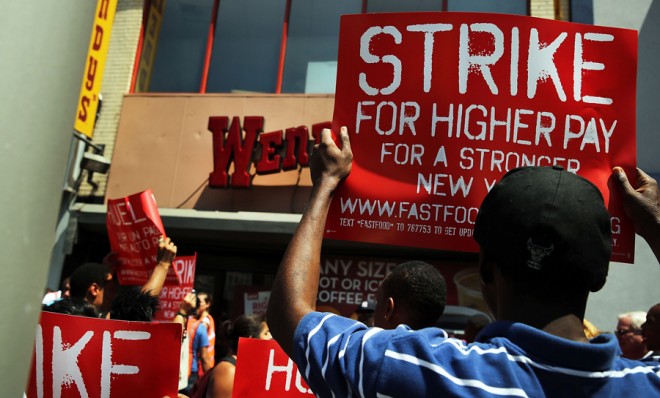Would it be smart for fast-food chains to raise wages?
There's an economic case to be made for providing workers with a living wage

A free daily email with the biggest news stories of the day – and the best features from TheWeek.com
You are now subscribed
Your newsletter sign-up was successful
Thousands of fast-food workers across the country walked off the job this week to protest for higher wages at restaurants like McDonald's and Kentucky Fried Chicken, the third such strike this year.
Protesters are asking for $15 an hour — a 66 percent bump from the average $9.02 earned by a fast-food cook — and the right to unionize without retaliation from employers.
Their cause has some powerful supporters. During a speech on the economy at Knox College in Illinois last week, President Obama reiterated his view that minimum wage should rise to $9 an hour, from $7.25 an hour, and that it should be automatically adjusted with inflation, so that wages rise with the cost of living.
The Week
Escape your echo chamber. Get the facts behind the news, plus analysis from multiple perspectives.

Sign up for The Week's Free Newsletters
From our morning news briefing to a weekly Good News Newsletter, get the best of The Week delivered directly to your inbox.
From our morning news briefing to a weekly Good News Newsletter, get the best of The Week delivered directly to your inbox.
"Because no one who works full-time in America should have to live in poverty, I am going to keep making the case that we need to raise the minimum wage — because it's lower right now than it was when Ronald Reagan took office. It's time for the minimum wage to go up," he boomed.
But Congress is nowhere near a vote on this issue. "On their last week before vacation, Congress isn't likely to raise the minimum wage. They're not even close to critical mass on that issue," says CNN. "There aren't any votes scheduled any time soon and it hasn't yet had a hearing in the House of Representatives this year."
Which leaves the issue upto the employers — the fast-food giants that set the wages in the first place. As Jena McGregor at The Washington Post argues, these businesses have some incentives to hike wages, even without pressure from Congress:
If I were CEO of one of these companies, my worry would be comments like this one from a 25-year-old fast-food worker in a recent story in the Post: "I’m not really concerned about losing my job. If I don’t do anything, I am in a lose-lose situation. I can still get fired at any time." It’s an organizational problem when wages are so low that employees are barely worried about keeping their jobs.
The economists may have numbers about poverty lines and minimum wages, hourly rates and what constitutes a living wage. The harder number to find is the one that leaves workers feeling respected, motivated and valued enough to want to do a good job. [The Washington Post]
But is that realistic? Hannah Ridge at PolicyMic says, "There is limited economic incentive for the companies to increase their wages":
A free daily email with the biggest news stories of the day – and the best features from TheWeek.com
With unemployment at 7.6 percent, the companies can replace low-skilled workers. Additionally, these are for-profit companies with a responsibility to their stockholders. They exist to make money, not to take care of workers, despite any moral or sentimental inclinations or obligations. Taking those facts in conjunction, despite the protests, the companies are economically incentivized against acquiescing to the strikers' demands. [PolicyMic]
However, some argue that raising wages would not significantly hurt the bottom line or raise prices for consumers. The Huffington Post reports that doubling the salaries of all workers at McDonald's — including its CEO — would cause the cost of a Big Mac to rise by a mere 68 cents.
Henry Blodget at Business Insider notes that McDonald's would still make a healthy profit if it bore those additional costs, and argues that there's an opportunity for McDonald's and other fast-food chains to please everyone:
That possibility is that McDonald's could double its restaurant-worker wages and not increase its prices at all...but instead just make a little less money. In other words, it could better balance the interests of all three of its stakeholders — shareholders, customers, and employees — instead of shafting employees to deliver as much profit as possible to shareholders. [Business Insider]
Carmel Lobello is the business editor at TheWeek.com. Previously, she was an editor at DeathandTaxesMag.com.
-
 Health insurance: Premiums soar as ACA subsidies end
Health insurance: Premiums soar as ACA subsidies endFeature 1.4 million people have dropped coverage
-
 Anthropic: AI triggers the ‘SaaSpocalypse’
Anthropic: AI triggers the ‘SaaSpocalypse’Feature A grim reaper for software services?
-
 NIH director Bhattacharya tapped as acting CDC head
NIH director Bhattacharya tapped as acting CDC headSpeed Read Jay Bhattacharya, a critic of the CDC’s Covid-19 response, will now lead the Centers for Disease Control and Prevention